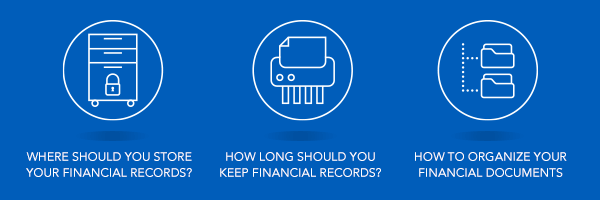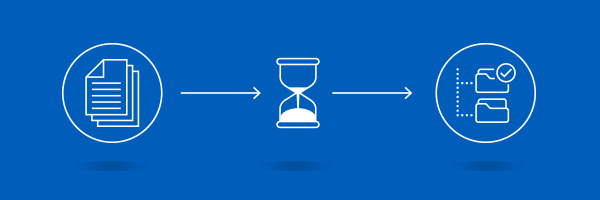Financial Record Keeping Best Practices
Here, we’ll outline some strategies and best practices for organizing your financial records:

Where should you store your financial records?
Maintain an area that is dedicated to keeping financial records. This should include all of your statements, tax forms and records, donation and healthcare receipts, legal contracts, insurance claims, and other documents. If you own a home, you should keep your repair and improvements bills. For most people, this may be the only way to substantiate the expenses, which may help you reduce capital gains liability when you sell it. If you are also responsible for your business’s financial documents, make sure to keep them separate from your personal documents.
For your physical records and documents, we recommend keeping a filing cabinet organized into relevant folders. Then, each year, it’s very easy to transfer the previous year’s files into a standard bankers box.
How long should you keep financial records?
It is also important to know how long you should keep different statements and documents. For information on how long to keep and when to shred financial documents, you might want to check out this chart from Money Smart Guides.
Keep in mind, the IRS can audit returns up to 3 years back, though in some cases this can extend to 6 years or even longer. Some documents, such as final pay stubs for each year you were employed, should be kept indefinitely, to help substantiate your income in matters related to social security benefits. Additionally, you might also want to consider keeping these in a cabinet that locks or even in a fireproof safe.
For financial paperwork you no longer need, you should plan to securely dispose of them ASAP. If you don’t have a shredder, it’s very inexpensive to get your documents disposed of securely at stores like Staples and OfficeMax. Additionally, you can regularly find sponsored “shredding events” in your area where you can drop off the papers you’re looking to dispose of.
How to organize your financial documents
It may make sense to organize your cabinet alphabetically, but you may also choose to order your folders by accessibility, putting the files you regularly reference towards the front, and the ones you’re just holding onto for reference towards the back.
To keep your digital records organized, you should structure the folders on your computer similarly to the way your paper documents are organized. Additionally, you should always keep your files backed up – we recommend cloud storage tools like Box, Dropbox, iCloud, etc. For your identity-related documents (drivers license, insurance card, passport, social security card, COVID vaccine record), you should keep additional backups that are easily accessible from your phone (like in your password manager).

Get in the habit of filing everything immediately
The importance of this can’t be overstated – the longer your documents stay unfiled, the less likely they are to make it into the right place. Make sure that wherever you are filing, everything is labeled clearly so that you are able to access exactly what you need as soon as you need it. For digital files, we recommend “YYYY MM DD Descriptive File Name”. This makes it easy to sort and search for files.
Ultimately, if you are mindful about staying consistent and keeping your sensitive information organized and safe, you will have peace of mind knowing that the information you may need will always be easily available!